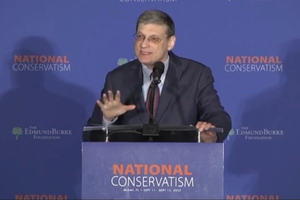The Commonly Misunderstood Common Good
“By common good is to be understood ‘the sum total of social conditions which allow people, either as groups or as individuals, to reach their fulfillment more fully and more easily.’” (CCC 1906)

References to the common good are, well, quite common these days. It seems the common good is everywhere.
Apparently, it’s a medical research company in Australia. It’s a single-use, plastic packaging company located in Brooklyn. It’s a North Carolina retailer that “consciously curates” a space for something called “intentional consumerism.” I’m told it’s also a “non-profit, non-partisan” organization made up of “civically-minded” professionals located in Los Angeles and Washington, D.C., not to be confused with the “nonpartisan, reform coalition” out of New York and D.C. whose board membership boasts former Democratic New Jersey senator, presidential candidate and NBA basketball player Bill Bradley. And don’t forget about the “advertising, design and business transformation company” specifically aimed at brands whose mission is to “change the world for the better.”
Not every organization explicitly references the common good in its name but that doesn’t mean the biggest corporations in the world care any less about it. Wells Fargo, JPMorgan Chase, Goldman Sachs and Microsoft — among many others — position themselves as “socially responsible” champions of the common good. Larry Fink, CEO of Blackrock — the world’s largest asset manager — is perhaps the most famous. A proponent of what has now become known as ESG investing — investing based on a company’s score on environmental, social and governance policies — Fink isn’t afraid to use his company’s considerable clout. Blackrock regularly threatens to pull support from organizations if they fail to demonstrate sufficient progress on what he deems important societal metrics.
Last year, Fink decided that pursuing the common good meant that Blackrock would begin covering travel costs for employees seeking abortions. Not to be outdone, dozens more companies publicly announced they would do the same including Citigroup, Apple, Netflix, Salesforce, Starbucks and Zillow. More recently, companies like Amazon discovered that the policy should have no limiting principle: travel costs should also be provided to support those seeking surgical procedures to change their sex organs. Many more companies jumped on board. Cosmetic company Lush declared, “Black Trans Lives Matter!” Lyft proclaimed, “Two is too few!” Target’s “tuck-friendly” bathing suits, “gender fluid” mugs and book titles, “Bye, Bye Binary” and “Pride 1, 2, 3” aimed at children ages 2-8 were all offered because the company was a good corporate citizen with its eye on the common good.
Academe has long been in the common good game. Bowdoin College proudly references it as not something they own but something they seek. Glasgow Caledonian University is more bold, calling itself the “University for the Common Good.” Several Ivy League institutions are in on the fun, dedicating a specific part of their career labs to students looking to pursue professions for the common good. The Yalies call theirs “Common Good and Creative Careers” while Brown calls theirs “Careers in the Common Good.” Don’t worry: it appears those students who want to use their $400,000 four-year degree to destroy the world and feast on its entrails can use another part of these universities’ career portals to find suitable employment. In other news, Yale and Brown both continue to hold separate — not common — graduation ceremonies for those who celebrate identifying by their gender and race.
But it’s the Catholic Church that tells us where we can really find the common good. Emanating from a fundamental awareness that we are each uniquely created by God and for God, an authentic understanding of the common good turns our focus back toward our Creator. It reminds us of our interdependent nature and our responsibility to help each other develop our lives in the way that God intended. Defined by the Catechism of the Catholic Church as “the sum total of social conditions which allow people, either as groups or individuals, to reach their fulfillment more fully and more easily” (CCC 1906), its pursuit necessitates an eternal orientation and “presupposes respect for the human person” as an individual who enjoys inherent dignity and worth (CCC 1907). Accordingly, in all that we do, we are called to help our neighbors access those temporal goods that will enable them to live truly human lives while fostering their knowledge of and their relationship with God. Doing the former without the latter will never allow for authentic fulfillment — a truth all too evident today.
A former colleague at Providence College, Dominican Father Bonaventure Chapman, once wrote, “The common good is God; nothing more, nothing less.” He put it this way: “The common good, all our social striving, all our individual acts, are to conform to this end” and clarified that it is “not some utilitarian calculus of the ‘greatest happiness of the greatest number.’ Nor is it this-worldly Utopian social scheme. The common good is God; it is achieved through ordering all actions with his divine governance and providence, each thing in its own proper place and with itsown proper significance.”
And so, as corporate CEOs, college administrators and so many others very ably demonstrate today, the common good is commonly misunderstood. But people of faith need not be confused. Let’s pray for the courage to show others we aren’t.
Ronald L. Jelinek, Ph.D., is a professor of marketing at Providence College. The opinions expressed here are his own.
- Keywords:
- common good















